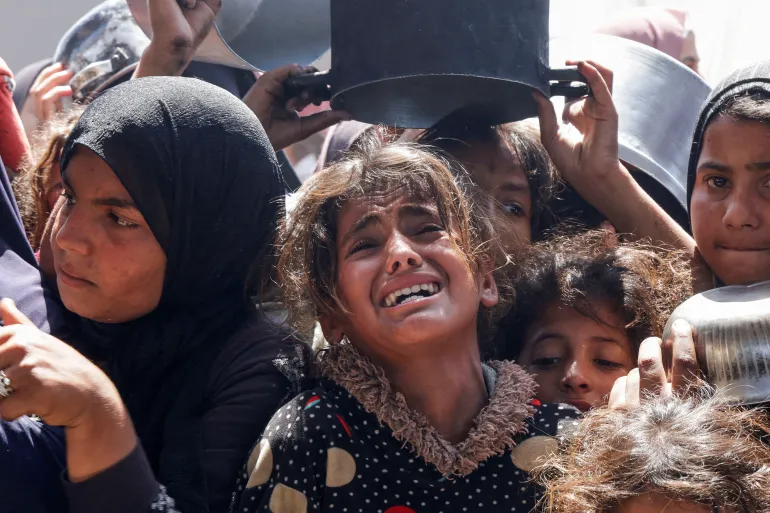THE OTHER SIDE: The Palestinian Experience that the American Media does not want to talk about by Lawrence Walker

An Israeli strike near Gaza City’s Al-Shifa Hospital has targeted and killed a group of four Al Jazeera journalists and an assistant. The attack has been condemned by journalists and rights groups. Among those killed is Anas al-Sharif, a prominent correspondent. He was previously part of a Reuters team that won a Pulitzer Prize in 2024 for its coverage of the war in Gaza. Al-Sharif had previously been threatened by the Israeli military, which accused him of being the leader of a Hamas cell posing as a journalist. The IDF posted what it says are documents showing a connection between al-Sharif and Hamas. These have not been independently verified. Both al-Sharif and his network have long rejected Israel’s accusations. Before this attack, UN Special Rapporteur Irene Khan said Israel’s claims against al-Sharif were unsubstantiated.
The other side of the conflict refers to the Palestinian experience of the Israeli occupation, blockade of Gaza, and the devastating impact of the ongoing war that began in October 2023. The Palestinian narrative emphasizes historical displacement, the devastating humanitarian crisis, and the fight for self-determination.
The Ongoing War and Humanitarian Crisis in Gaza
Two years after the war began in October 2023, the scale of destruction in the Gaza Strip is immense.
- Casualties: Since October 7, 2023, over 77,000 Palestinians have been killed in Gaza, and nearly 270,000 injured, according to the territory’s Ministry of Health. The majority of casualties are women and children.
- Displacement and Infrastructure damage: Israel’s military campaign has resulted in the destruction or damage of more than 90% of homes and almost all infrastructure in Gaza, displacing 1.9 million Palestinians 90% of the population multiple times.
- Famine and Malnutrition: In August 2025, the Integrated Food Security Phase Classification (IPC) confirmed that famine was occurring in Gaza City and projected it to spread. By mid-August, nearly one in three children in Gaza City were acutely malnourished, and hundreds of thousands of people face catastrophic levels of hunger.
- Healthcare Collapse: Only a handful of hospitals in Gaza are partially functional, with facilities understaffed, lacking supplies, and overwhelmed with patients. As of October 2025, the war had killed at least 1,670 medics and damaged 125 clinics and hospitals.
The Palestinian perspective on the root causes
Palestinians and their advocates frame the conflict within the historical context of Occupation and Displacement to never come back.
- Occupation and Blockade: Palestinians have been living under Israeli occupation since 1967 in the West Bank, East Jerusalem, and Gaza. Since Hamas took control of Gaza in 2007, Israel and Egypt have imposed a severe blockade that has isolated the territory and restricted the movement of people and goods.
- System of Control: Many Palestinians argue that the occupation and blockade amount to a system of Racial Oppression and Apartheid, a position supported by International Human Rights Organizations and a UN Special Rapporteur.
- Settlements: The construction of Israeli Settlements in the West Bank is considered illegal under International Law (what law). Palestinian leaders demand the removal of all settlements, while the Israeli Government maintains they are legitimate and permanent. In July 2024, the International Court of Justice called Israel’s presence in the Occupied Palestinian Territories illegal and said it should withdraw all settlers.
- Violence and Retaliation: Palestinians often view their actions as resistance to occupation and oppression. Some research shows that Palestinian violence occurs in a pattern of retaliation to Israeli Military Actions, rather than being random.
- Two-State Solution: While the internationally backed two-state solution proposes an Independent Palestinian State in the West Bank and Gaza alongside Israel, many Palestinians doubt its viability. Israeli rejection of the two-state solution and continued settlement expansion have contributed to this skepticism. This Two-State Solution, will never happen because every US President over 60 years has allowed Israeli to do what every they wanted to do which is take the land from the Palestinians and not be held accountable for the taking of their lands. This is why Israeli has gotten away with suppressing the Palestinians and what Israeli have been doing for over 60 years.
Life in the West Bank
The situation for Palestinians in the West Bank has also escalated since the war began.
- Settler Violence: Israeli Settler attacks against Palestinian Villages have sharply increased for over 30 years and before October 7, 2023. More than 1,500 settler attacks were reported in 2025 alone.
- Increased Military Action: Military Raids, Mass Arrests, and home demolition campaigns by Israel have displaced thousands of Palestinians and led to hundreds of deaths in the West Bank. But nothing has been said by the UN Nations and the US. Government.

